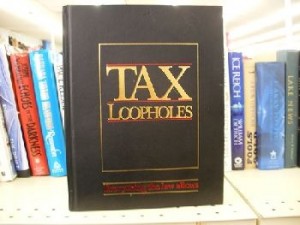Tax Loopholes
Tax Loopholes for the Rich
Tax Loophole Definition
Tax loopholes are ways to mitigate tax liabilities by exploiting tax laws. It has originally been legally created as a way to reduce the amount of federal income tax as tax breaks that are still within the boundaries of the tax law. It is a way to reward good taxpayers by saving some of their hard earned money.
The government has changed the tax code and its wordings constantly to deflect tax code experts and tax lawyers from discovering any probable loopholes. Sometimes, there are people hired and paid handsomely to discover the tax loopholes for the rich to manipulate and has the means to deduct more from their federal income tax. On the other side, there are some people that report these loopholes to lawmakers so the wordings of the tax code can be amended.
There are many ways to reduce federal tax by using tax loopholes. One acceptable loophole would be individuals deferring income by asking employers to release their year end bonuses on January instead of before the end of the year, so there is a possibility of the individual falling under a lower tax rate bracket.
Donating stocks or property instead of cash on charitable institutions can get a federal tax deduction and avoid paying on capital gains. Consolidating miscellaneous deductions to meet with the 2% IRS threshold on adjusted gross income and hastening huge deductions like property tax, mortgage interest and state income tax especially in high income periods can help as well.
Starting a home-based business can cut down on personal federal income tax liabilities. A percentage of the rent, internet connections, repair work, security system, communication services (mobile phones), repair work, marketing, advertising, travel expenses, training, seminars, classes, workshops, system upgrades, software, hosting services, waste disposal, real estate tax, and courier service can all be classified as business expenses and can accumulate legal federal tax deductions for businesses held at home.
Tax loopholes that real estate buyers often utilize would be to purchase a property and live in it for two to three years, fixing it up so the value increases and then they sell it. There are no capital gains for a sale of $250,000 (single) or $500,000 (married/joint filing) if it’s not the primary home.
If faced with a large capital gain, selling stocks that are losing in the market can offset it and can decrease federal income tax liabilities on gains corresponding with the loss. Tax loopholes regarding selling stocks on mutual funds before the distribution date can help avoid paying the upcoming tax. Investing on retirement accounts to the maximum amount can also defer taxes. Just make sure to know the contribution dates to avoid penalties and interests and save on money.
Corporate, municipal and government bond prices tend to fluctuate too. When bond prices are falling, the value of the investment is still the same but the income is less and it’s better to swap it with another bond through a broker. Selling failing bonds can cause federal tax loss and can be used as a deduction.
In recent times, tax loopholes has been utilized as a means for tax avoidance or tax evasion by individuals, trusts, corporations and other entities to get off from paying their due federal taxes through illegal ways.
There are many different methods of tax avoidance. One good example is a corporate tax loophole that allows companies to establish offshore branches to lessen their corporate tax liabilities. There are others that can changes the tax residence to a “tax haven” country such as Monaco in order to file a lesser federal income tax. This may be probable to many countries, but in the United States, every citizen and business entity is liable for federal taxes on all their global income. Because of this, loopholes have been discovered in the tax code allowing that any income accumulated abroad or in another company cannot be taxed in the United States. This is something world travelers or businesspeople, who travel to offshore branches of the company they’re working for, have been using to lessen their taxable income.
Avoidance in paying federal tax liabilities decreases government revenue and makes people behave and disregard the importance of the tax system. The government uses every means to control, prevent or limit tax loopholes. The government has an ongoing fight to amend tax legislation. In 2003, the US Tax Disclosure Regulations has prompted tax avoidance schemes to fuller disclosure. The Internal Revenue Service or IRS has been vigilant in finding out individuals, corporations and other entities using tax loopholes in an abusive or illegal manner.
To find out more about federal income tax loopholes Click Here





